JICA | HERALBONY: A Society where 8 Billion People Can “Radiate Their Unique Colors”
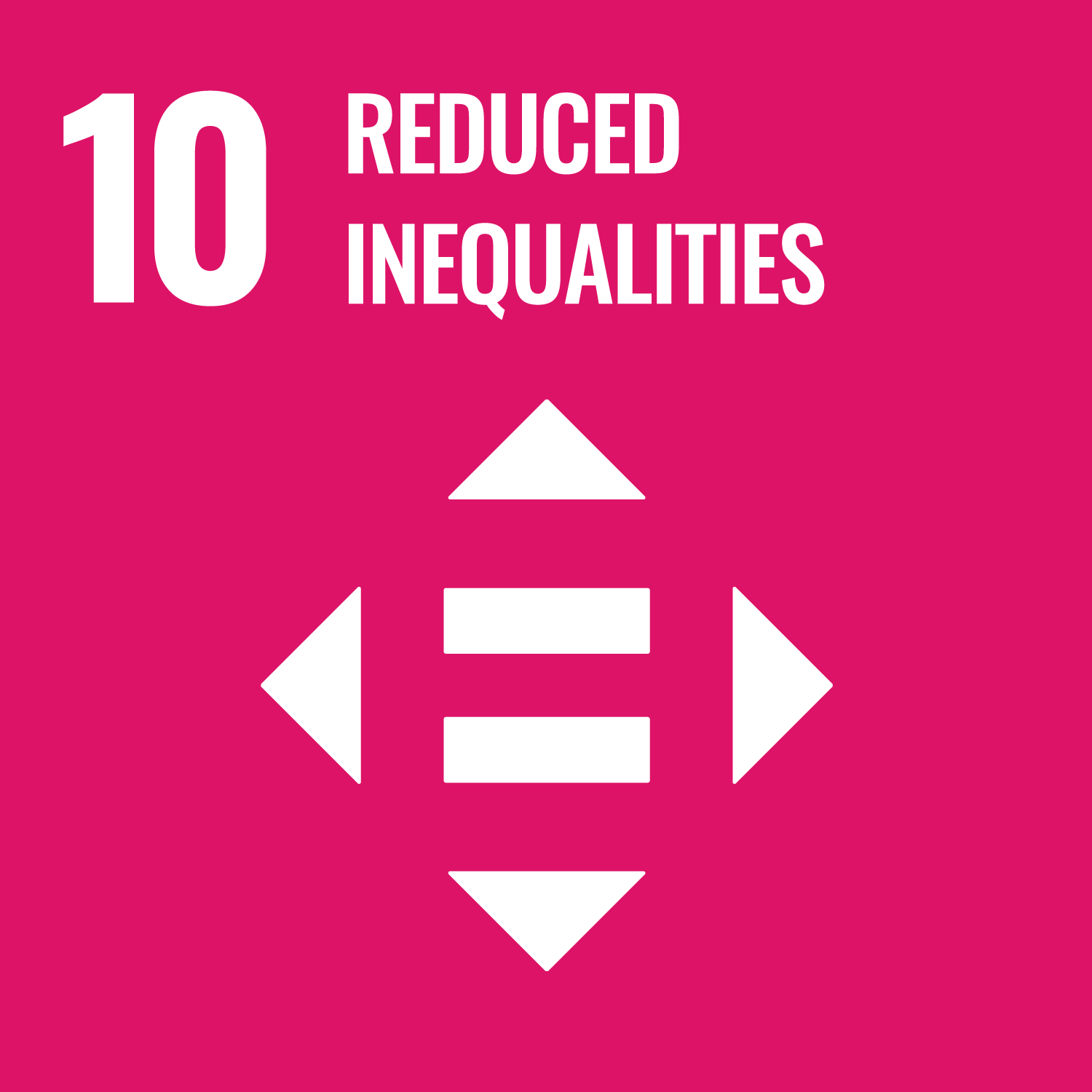
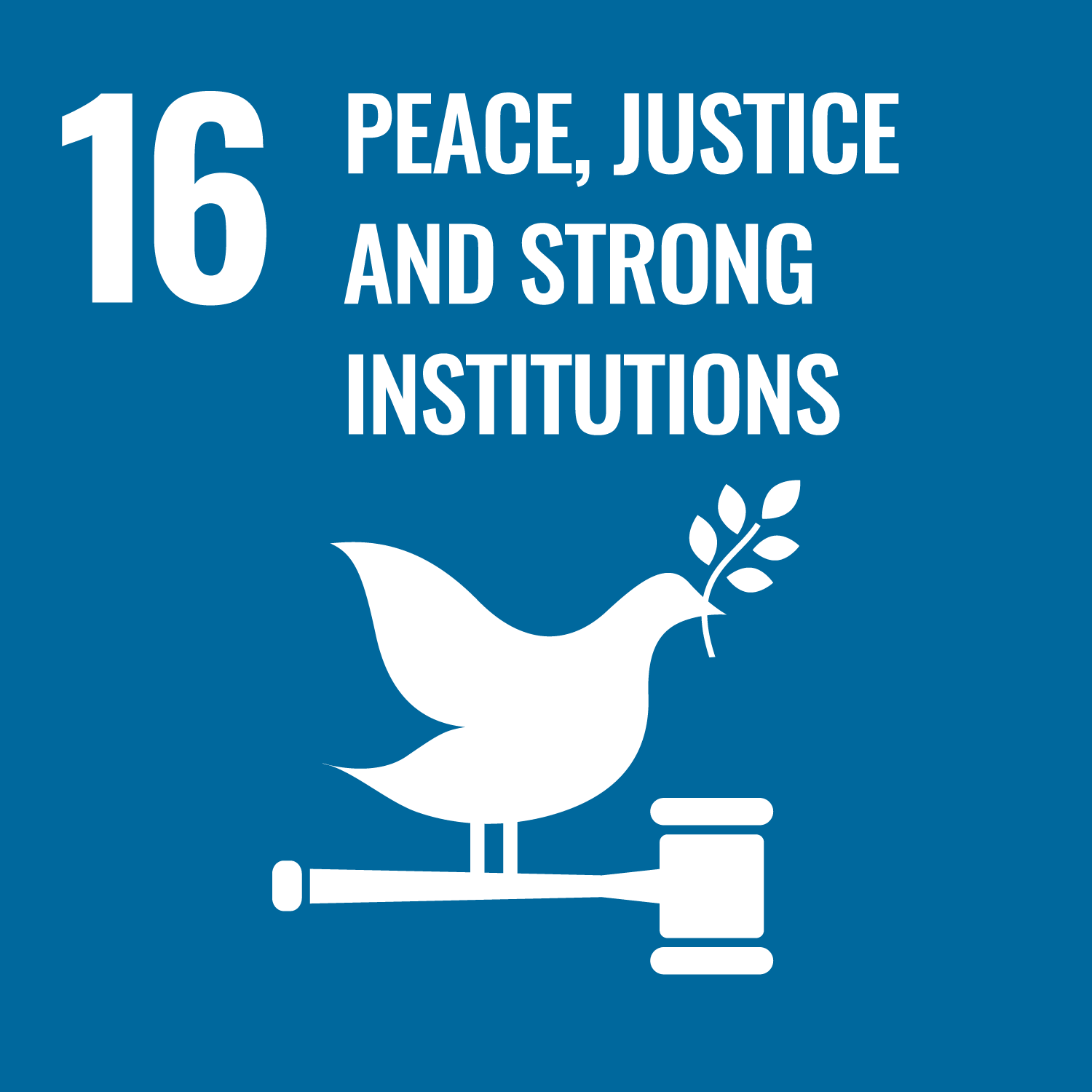

2025.02.14
JICA, which aims to create a society where everyone, including those with disabilities, can live with dignity, is joining forces with HERALBONY, a company dedicated to reshaping perceptions of disabilities through art-based business. Matsuda Takaya, Co-CEO of HERALBONY, and Miyazaki Katsura, JICA Executive Senior Vice President and Chief Sustainability Officer (CSO), share their insights into the values this collaboration can bring to society.
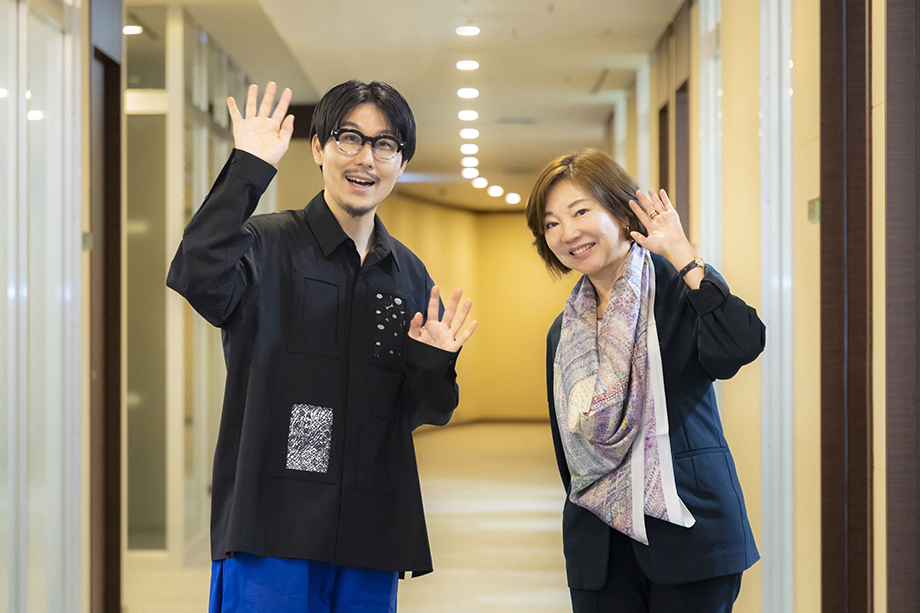
Matsuda Takaya, Co-CEO of HERALBONY (left), and Miyazaki Katsura, JICA Executive Senior Vice President and Chief Sustainability Officer (CSO) .
HERALBONY’s mission statement is “Radiate Your Color.” The company uses its licensing model of signing art licensing agreements with artists—particularly individuals with intellectual disabilities in Japan and abroad—to develop collaborations with numerous businesses. HERALBONY expresses its values through ideas and goals such as “disabilities are not deficiencies but characteristics,” “being ‘different’ only opens countless doors to endless possibilities,” and “to change the image of ‘disability,’ we want to expand our activities globally.” These resonated with JICA, which expressed a desire to collaborate on initiatives in developing countries and began co-creation efforts with HERALBONY in May 2024.
Since then, government officials from developing countries engaged in sports and education programs for persons with disabilities have visited HERALBONY’s headquarters in Morioka, Iwate Prefecture, and the Lumbini Art Museum in Hanamaki City, where HERALBONY’s contract artists showcase their works. HERALBONY representatives and contract artists in turn have visited the Asia-Pacific Development Center on Disability (APCD) in Thailand, which is supported by JICA, further advancing collaborative initiatives.
Through their collaboration, Matsuda Takaya of HERALBONY and Miyazaki Katsura, Executive Senior Vice President of JICA, shared their passion for realizing a society where diverse individuals can thrive as their authentic selves.
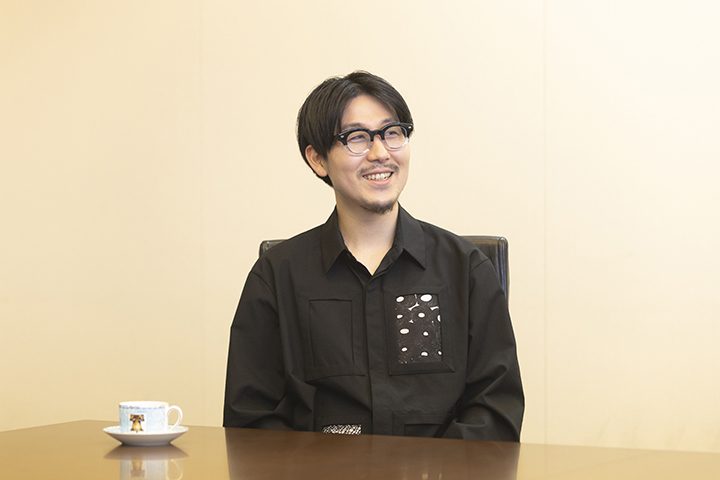
Matsuda Takaya
Co-CEO of HERALBONY Co., Ltd.
Born in 1991 in Iwate Prefecture, Matsuda graduated from Tohoku University of Art and Design. After working as a planner at the creative agency Orange and Partners Co., Ltd., he co-founded HERALBONY with his twin brother, Fumito, in 2018. In 2024, they were selected as one of Forbes Japan’s Culture-preneurs 30, which highlights 30 cultural entrepreneurs shaping the future.
Miyazaki: I was really looking forward to speaking with you, Mr. Matsuda. I have worked to promote gender equality, women’s empowerment, and diversity, equity, and inclusion (DE&I) in both organizational and project contexts. But a lingering frustration remains regarding how these concepts have yet to be fully embraced. JICA must consider diverse perspectives in its work as a public institution advancing development cooperation. However, I sometimes wonder whether we are truly addressing the needs of each individual in the best way. HERALBONY is a company that genuinely engages with each person with disability through art, striving to create a new culture. What drives you to harness diversity and generate new value?
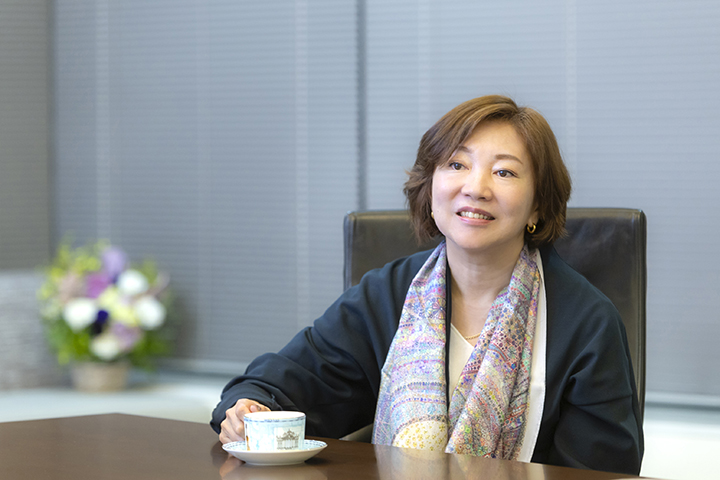
Miyazaki Katsura
Executive Senior Vice President and Chief Sustainability Officer (CSO) at JICA
Miyazaki has held various leadership positions, including Senior Director of the Office for Gender Equality and Poverty Reduction, Infrastructure and Peacebuilding Department; Chief Representative of the JICA Thailand Office; and Director General of the Governance and Peacebuilding Department. She was appointed as a JICA board member in October 2022 and assumed her current role in May 2024.
Matsuda: The reason my twin brother, Fumito, and I founded HERALBONY stems from our older brother, who is four years our senior and has severe autism with an intellectual disability. Growing up, we witnessed people mocking him, and were often told things like, “You twins need to work hard for your brother’s sake.” I very much wanted to change the world in which it is assumed that persons with disabilities need to be “supported.” I wanted to create a narrative of “respect” and build a business that could achieve that result.
One day, my mother took me to the Lumbini Art Museum in Hanamaki City, Iwate Prefecture, which exhibits art by individuals with intellectual disabilities. I was struck as if by lightning. I saw incredible artworks of pure artistic brilliance; they had nothing to do with whether or not the artist had a disability. I wanted to create a system that could present such outstanding works to the world, and that’s why we started HERALBONY. At the time, I was working at a PR company, where I managed the licensing business for Kumamon, the Kumamoto Prefecture mascot. I thought it would be worth trying something similar for artists with disabilities, and my twin brother and I decided to take the plunge.
Miyazaki: You view disabilities as “a radiance of colors” In the same vein, refugees, who are often the focus of JICA projects, tend to be perceived as needing support because they are seen as pitiable. But we see them as active participants in their own development. Respecting the position of each individual and engaging with them respectfully is a fundamental value shared by JICA and HERALBONY.
Matsuda: We value the concept of “artist first” at HERALBONY. Because the company relies on the creativity of our artists, respecting them is paramount. I’m not a fan of the term ‘disability art.’ We try to provide a fair platform where talented artists are recognized for their abilities, free from labels.
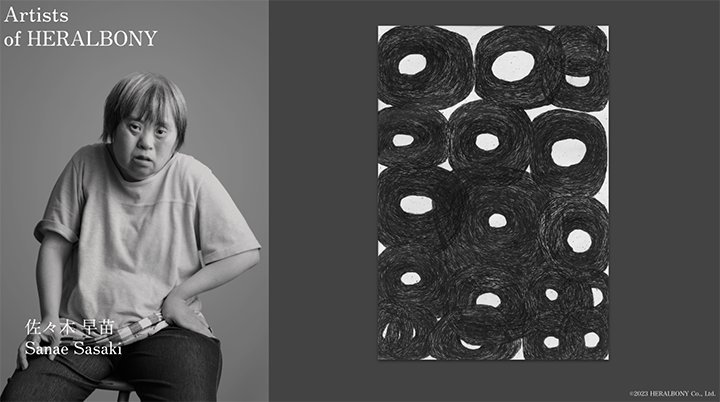
Sasaki Sanae, a contract artist with HERALBONY, and one of her works.
Miyazaki: As part of our collaboration, you, along with your HERALBONY representatives and contract artists, visited Thailand, where you toured UN agencies and welfare facilities. I heard that during your visit to the Asia-Pacific Development Center on Disability (APCD), you were struck by the fact that the mainstream approach in Thailand focuses on providing training and rehabilitation programs for individuals with disabilities.
Matsuda: In Japan, welfare facilities used to be called “rehabilitation facilities.” Their primary goal was to help individuals with disabilities become more like those without disabilities. I felt that this mindset still exists in Thailand. This is not to imply that either approach is better or worse, but at HERALBONY and some welfare facilities in Japan, the focus is shifting from helping people overcome what they cannot do, to highlighting what they can do, and celebrating their unique qualities. In Thailand, we also had the opportunity to interact with local artists with disabilities and gained many valuable insights.
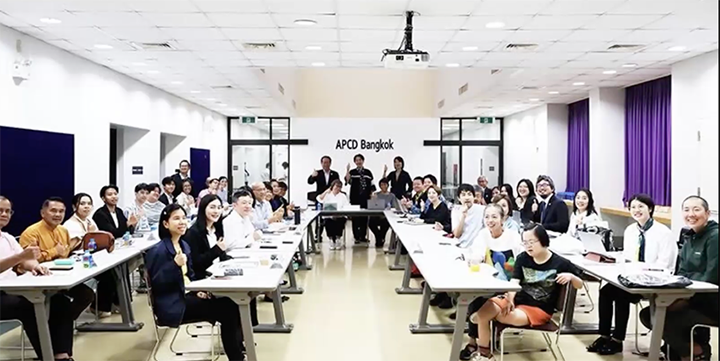
HERALBONY representatives and Japanese artists visited the Asia-Pacific Development Center on Disability (APCD) in Bangkok. The team also connected with local artists with disabilities at a welfare facility.
Miyazaki: In the future, I hope that this mindset can be introduced to welfare facilities in Thailand, though I’ve heard that the approach to intellectual disabilities in rural areas of Thailand differs greatly from that in urban areas. Until now, HERALBONY has primarily engaged with individuals with disabilities who express themselves through art. Do you have any plans to reach out to other individuals with disabilities?
Matsuda: Absolutely. HERALBONY is now creating a narrative of respect, focusing on exceptional individuals with disabilities who demonstrate remarkable potential. The reality is that many individuals with disabilities, like my brother, are in situations where they work jobs such as crushing cans for a wage of 3,000 yen a month. I want HERALBONY to become an organization that focuses on and addresses the realities facing persons with disabilities.
My ambition is to grow HERALBONY into a global brand. But first, I want to establish a system, such as public foundations to support projects that are not economically viable. I feel that these schemes could be beneficial for startups interested in solving social issues. I don’t want HERALBONY to be simply an art company.
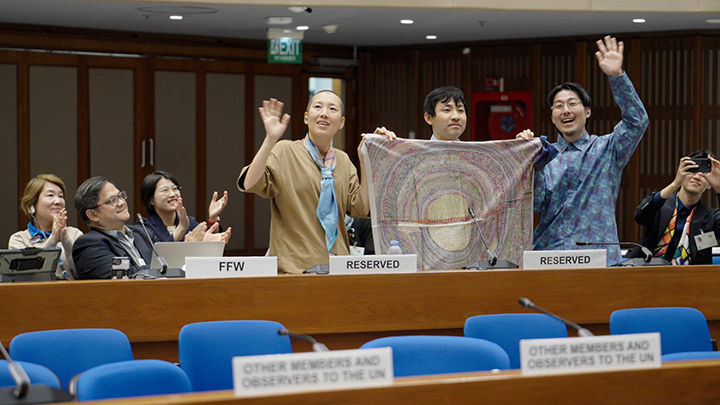
Artists Asano Haruka and Iga Kaoru and HERALBONY’s Matsuda Takaya participate in a panel discussion hosted by the United Nations Economic and Social Commission for Asia and the Pacific (ESCAP). The scarf being shown features Asano’s artwork.
Miyazaki: In May 2024, HERALBONY received an LVMH Innovation Award 2024 from the world’s largest conglomerate, LVMH, which owns brands such as Louis Vuitton and Christian Dior. In July, you also established a local subsidiary in Paris, where you are developing collaborations with some of Europe’s most recognized brands.
JICA must join hands with diverse stakeholders to address increasingly compounded global challenges. Promoting co-creation is especially critical, though these initiatives come with these difficulties. I think it’s remarkable that HERALBONY has already connected with so many companies just six years after its founding.
Matsuda: Our business has really started to gain momentum over the past two to three years. The first step was receiving financial support from those who empathized with HERALBONY’s mission and wanted to support us. Because art has limitless applications, from scarves to wallpapers, its versatility makes it possible to collaborate with virtually any company.
I’m very grateful for the opportunity to collaborate with JICA, as this partnership provides us with the chance to create even more opportunities. We want to expand the reach of our activities to developing countries, but it’s difficult for HERALBONY to operate in these regions on our own. Partnering with JICA, which already has established local trust and respect, is a huge advantage for us.

HERALBONY has collaborated with numerous companies, including on the design of the HERALBONY Card with Marui Group Co., Ltd. (left) and in-flight amenities for Japan Airlines (right).
Miyazaki: In an attempt to establish the HERALBONY Art Prize 2025 as an international art award, we introduced it overseas through our JICA offices and have already received interest from more than 10 countries wanting to participate. We’re hopeful that this can foster a new form of collaboration with JICA as well.
Matsuda: It would be interesting to create a special JICA award for submissions from developing countries.
Miyazaki: That’s a wonderful idea. I believe we need to incorporate the perspectives of individuals with disabilities not only in the field of art but also in other areas such as agriculture and transportation infrastructure. I’d be grateful for any advice you might provide.
Matsuda: I hope we can collaborate with groups of persons with disabilities to change the term “disabled,” and I’d be delighted to work on this with JICA. It would be wonderful to see such ideas from Japan spread internationally, leading to a global shift in perspectives. I hope we can build more connections by creating new values.
Miyazaki: Similar to the way you feel about the term, “disabled,” I’ve lately been questioning whether the term “developing countries” is even appropriate. Perhaps “partner countries” would be a better description. Let’s continue to learn from one another and work together toward new approaches and perspectives.
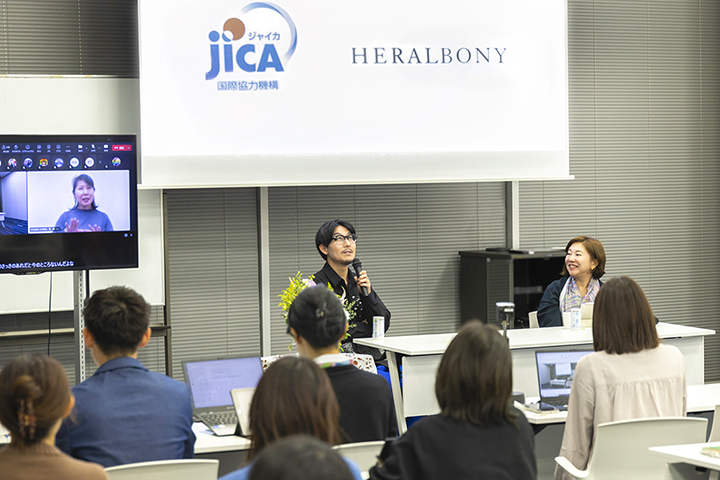
Matsuda and Miyazaki also held a discussion at an internal JICA seminar. Sign language interpretation was provided at the seminar, reflecting how their collaboration is also having an effect on the advancement of DE&I within JICA.
scroll